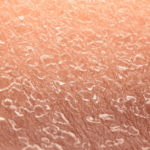If you’re someone who pays attention to their skincare regimen even remotely, you wouldn’t doubt the importance of moisturizing. Even Cleopatra used to bathe in milk to keep her skin moisturized.
But news flash – moisturizers don’t moisturize. Don’t get us wrong — moisturizers work. But not by adding moisture to the skin, but by locking existing moisture into your skin. So if you’re someone who’s constantly trying to get rid of dry skin, you need to work on the concept of locking-in moisture.
In this article, we introduce you to ways that can help you keep your skin dewy and supple.
1. Know Your Skin Type

The first step to choosing the right moisturizer for your skin is to determine your skin type. Is your skin extremely dry? Does it produce plenty of oil? Or do you think it’s combination skin and is mostly affected by weather? In any case, your moisturizing needs will differ.
To figure out your skin type, wash your face and pat it with a towel. Wait one hour before applying cream or moisturizer. Now, after an hour, feel your skin and note how dry or oily it is. If it appears tight, you probably have dry skin. As a general rule, if it feels greasy, it’s oily skin. Combination skin will have a clean T-zone but tight cheek.
2. Find Suitable Moisturizing Ingredient

Now that you know your skin type, you can find a moisturizer that suits your skin type. As mentioned above, skin is either “oily” or “dry,” with “normal” in between. In addition, there are two other main categories: ‘sensitive’ and ‘mature’.
Here are the preferred moisturizing types for each skin type –
- The most effective moisturizers for dry skin are typically petroleum- or oil-based.
- Moisturizing oily skin requires a water-containing product. Also, make sure that it’s non-comedogenic to avoid clogging your pores.
- Similarly, normal skin requires a water-based moisturizer but with a lower percentage of oils than dry skin.
- If your skin is sensitive, you should use a moisturizer with medicinal or soothing properties. Choose moisturizers with chamomile or aloe, but avoid those that contain fragrance, dye, or acids.
- Alternatively, you can use body butter, an oil-based option that is natural.
3. Mindful Lifestyle Choices

You must have heard the phrase before — your skin is what you feed it.
Keeping that in mind, you should make lifestyle decisions that keep your skin healthy and moisturized –
- Drink enough water. It keeps your skin cells plump, which prevents dehydrated skin. Women should consume 2.2 liters of water, and men should consume 3 liters of water every day.
- Vitamin D deficiency makes the skin dry. Food items provide insufficient Vitamin D, so take supplements.
- Collagen-rich foods are like lubricating moisturizers from within. Include eggs, citrus fruits, and garlic in your diet.
- Foods rich in Vitamin A, fats, and protein keep your skin firm and healthy.
4. Keep Your Showers Cold and Short

Who doesn’t love a long, hot shower after a day of tiring work? Well, your skin!
Showers are a part of everyday hygiene — they clean the dirt and dead skin cells off your skin. However, hot showers strip your skin of essential, moisturizing oils. As a result, your skin becomes more prone to flaking and cracking. It also triggers your existing skin conditions and can cause facial or body acne.
So, bathe or wash your face with cold water instead of hot water. A golden rule to remember is that if your bathroom mirror fogs up, the water is too hot.
One more thing to keep in mind is the length of the shower. The ideal shower duration is between 5 and 15 minutes. The longer your shower is, the more moisturizing oils wash off your skin.
5. Moisturize Your Skin When Damp

Do you wait more than 5 minutes to apply moisturizer after stepping out of the shower? If yes, you’re not locking in the moisturizing properties of your cream into your skin.
Here’s how it works. Moisturizers contain humectants, which pull in water to hydrate your skin. If you provide it with water, it has no trouble holding on to moisture. If not, it pulls water from your skin instead of the surrounding air, leaving it even drier than before.
So, just pat your skin with a towel until it’s damp after the shower, and you’ll have the right canvas for moisturizing.
6. Be Gentle to Your Skin

Watch what you apply to your skin. Deodorant soaps, perfumed soaps, and alcohol products strip skin of its natural oils. So minimize their use. You should also steer clear of bath sponges, scrub brushes, and rough washcloths — they make your skin dry. Instead, use a soft fiber cloth and pat or blot your skin to dry.
If you get an infection or feel itchy, do not scratch your skin violently. Instead, use a moisturizer — it can control the itch. Or try using a cold pack or compress to relieve itchy spots.
Read: 8 Must-Know Do’s and Don’ts in Skin Care
7. Switch Your Moisturizer as Per Season

A skincare regimen that works for you in summer might not be as effective in winter. Your skin requirements change with the changing weather.
Winter has low moisture levels in the air, making your skin drier than usual. A rich moisturizer with hyaluronic acid can do the trick.
On the other hand, summers are hot and sticky. A lightweight cream can help your skin stay misted.
So, make it a rule of thumb to change your moisturizer at least twice a year. For example, use one winter to spring, and another from summer to fall. It will help your skin adjust to changing hydration levels and sun exposure.
Takeaway
Skin is the largest organ of your body. Maintaining hygiene and using enough moisturizer is vital to keeping it healthy. If you’ve been accepting rough, flaky skin as a foregone consequence of aging or the climate, it’s high time you changed your stance. Use the ways listed above to get rid of dryness and liven up your skin.
If you have chronic dry skin, you should see a dermatologist. They will prescribe a moisturizer tailored to your skin’s needs and recommend additional skin care practices.




